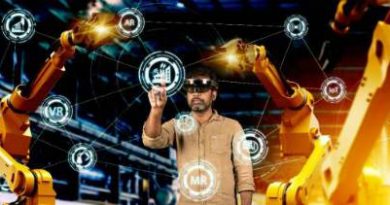The need for trained professionals in Robotics, AI, ML, Data Sciences and the requirement of retaining them for the Indian IT ecosystem
 India has become the hotbed of robotic technologies, AI, Artificial Intelligence, Machine Learning and Data Sciences. The Indian government has invested heavily in these emerging domains, which are driving the development of new technologies. However, there are concerns that India may not be able to retain its trained workforce in these domains due to a lack of incentives and proper training in these competencies.
India has become the hotbed of robotic technologies, AI, Artificial Intelligence, Machine Learning and Data Sciences. The Indian government has invested heavily in these emerging domains, which are driving the development of new technologies. However, there are concerns that India may not be able to retain its trained workforce in these domains due to a lack of incentives and proper training in these competencies.
Robotics, AI, ML and Data sciences are among the top five skills that companies around the globe are looking for in their business operations. Robotics is a broad term that includes topics such as research and development of robots, software programming to make them work, understanding the systems that control robots and a host of other related areas. Artificial Intelligence (AI) and Machine Learning (ML) are all related to robotics. Data sciences include skillsets such as modelling, processing and analysing data sets.
Data sciences also include topics such as predictive analytics, data mining and business intelligence.
A prominent example of this is taking place in stock exchanges, where high-frequency trading by machines has replaced much of human decision making. People submit buy and sell orders, and computers match them in the blink of an eye without human intervention. Machines can spot trading inefficiencies or market differentials on a very small scale and execute trades that make money according to investor instructions.
Over the last few years, we have seen a shift in the kind of skills required for professionals to stay relevant in their roles. The current skilled workforce in these areas is retiring and there is a dearth of trained professionals to replace them- which means that there is an imminent need for specialists in these domains.
AI systems can learn and adapt as they make decisions. In the transportation area, for example, semi-autonomous vehicles have tools that let drivers and vehicles know about upcoming congestion, potholes, highway construction, or other possible traffic impediments. Vehicles can take advantage of the experience of other vehicles on the road, without human involvement, and the entire corpus of their achieved “experience” is immediately and fully transferable to other similarly configured vehicles. Their advanced algorithms, sensors, and cameras incorporate experience in current operations and use dashboards and visual displays to present information in real time so human drivers can make sense of ongoing traffic and vehicular conditions. And in the case of fully autonomous vehicles, advanced systems can completely control the car or truck, and make all the navigational decisions.
AI-driven applications accelerate across many sectors, we must reimagine our educational institutions for a world where AI will be ubiquitous and students need a different kind of training than they currently receive. Right now, many students do not receive instruction in the kinds of skills that will be needed in an AI-dominated landscape. For example, there currently are shortages of data scientists, computer scientists, engineers, coders, and platform developers. These are skills that are in short supply; unless our educational system generates more people with these capabilities, it will limit AI development.
As with any new technology, it’s critical to avoid malevolent treatment that tries to deceive software or use it for nefarious purposes. This is especially relevant given AI’s dual-use capabilities, in which the same technology can be employed for good or evil. Individuals and businesses are exposed to extra risks when AI is used maliciously, undermining the benefits of the developing technology. Hacking, manipulating algorithms, undermining privacy and secrecy, and stealing identities are all examples of this. Attempts to use AI to obtain confidential information should be severely punished to dissuade such behaviour.
The days are gone when the Indian IT industry needed just skilled manpower for technology services. Now, it needs trained professionals to help build the future of automation and AI which is what the world expects from India.
Authored by:- Mr Ankit Saraiya, Director, Techno Electric and Engineering
(The views expressed in this article are by – Mr Ankit Saraiya, Director, Techno Electric and Engineering. Technuter.com doesn’t own any responsibility for it.)



